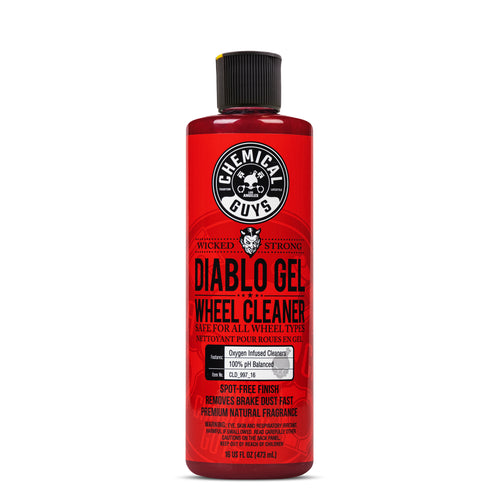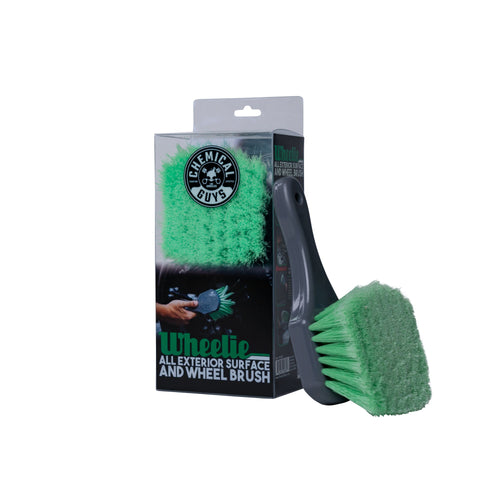There are a lot of products out there that claim to be the best, but not all of them deliver. The right cleaner needs to be tough on grime, safe for delicate finishes, and simple enough for anyone to use without stress. That’s why we keep coming back to these Chemical Guys essentials for getting wheels spotless:
Diablo Wheel Cleaner
Diablo Oxygen Infused Foam Wheel and Rim Cleaner is all about safe, foamy cleaning power. The oxygen-infused formula whips up a rich lather that clings to the wheel surface, breaking down brake dust and grease without relying on harsh chemicals. It’s pH-balanced, which means you can trust it on any finish from painted to chrome, and it leaves behind a streak-free shine every time.
Sticky Citrus Wheel Cleaner Gel
For the really stubborn stuff, Sticky Citrus Wheel Cleaner Gel is a beast. The gel consistency sticks where you spray it, giving it time to work into tight spaces and dissolve layers of brake dust and grime. Plus, it smells like citrus instead of chemicals, which makes wash day way less harsh on your nose.
Wheelie All Exterior Surface And Wheel Brush
A cleaner’s only as good as the tools you pair it with, and the Wheelie All Exterior Surface and Wheel Brush is the perfect sidekick. Its flagged-tip bristles are soft enough to protect delicate finishes but strong enough to dig dirt out of lug nuts, grooves, and spokes. Together with Diablo or Sticky Citrus, it makes wheel cleaning fast, thorough, and safe.
Pro Tips For Keeping Wheels Cleaner, Longer
Wheels don’t have to look filthy a few days after every wash. With the right habits and a little extra care, you can keep them looking fresh for weeks instead of days. Here are a few tricks every detailer swears by:
Apply A Wheel Protectant
After cleaning, adding a wheel sealant or protectant creates a barrier against brake dust, dirt, and road grime. This thin layer makes it harder for contaminants to stick, which means your next wash will be quicker and easier.
Wash Wheels First
When you’re detailing your car, always start with the wheels. They’re the dirtiest part of the vehicle, and cleaning them first prevents grime and brake dust from splashing back onto already-clean panels.
Rinse Frequently Between Washes
Even if you don’t have time for a full wash, giving your wheels a quick rinse with water helps prevent buildup from getting out of control. This small step goes a long way in keeping finishes safe from etching and staining.
Use The Right Tools Every Time
That soft brush you picked up for wheels? Stick with it and don’t cross-contaminate with other parts of the car. Dedicated tools keep scratches at bay and make sure your wheel cleaner always performs at its best.
Final Thoughts
Wheels might be the dirtiest part of your ride, but they’re also one of the first things people notice. Nothing kills a car’s look faster than dull, brake-dust-caked wheels. On the flip side, a set of sparkling clean rims instantly makes the whole car look sharper, newer, and more dialed-in. Clean wheels are a detail that separates a “quick wash” from a proper detail.
The good news is, you don’t need to stress over it. With the right products, the process is straightforward and even satisfying. Diablo Oxygen Infused Foam Wheel Cleaner brings safe, oxygen-infused foam that lifts away grime without risk. Sticky Citrus Gel takes care of those stubborn spots that won’t budge. And when you pair them with the Wheelie Brush, you’ve got a system that makes short work of the messiest wheels out there.
At the end of the day, showing your wheels some love is about more than looks, it’s about protection. Stay consistent, follow the right steps, and your wheels will keep turning heads long after you park. Shine on.
Read also:




